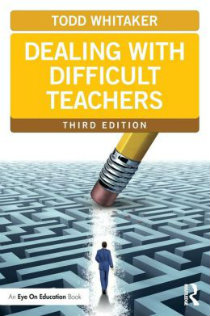Dealing with Difficult Teachers
Dealing with Difficult Teachers, Third Edition
By Todd Whitaker
(Routledge, 2014 – Learn more)
 Reviewed by William Evans
Reviewed by William Evans
In Dealing with Difficult Teachers, Todd Whitaker provides school administrators with a new approach to improve the culture or environment in their schools. For Whitaker, dealing with a difficult teacher is more than just removing them from the equation, and he suggests other options to transform the culture within a school.
Whitaker’s approach focuses on replacing negativity with positivity in a school; this applies to the students, the teachers, and the administrators. Admittedly, this approach takes work, and often a teacher’s positivity is buried under years or even decades of bad practices, failed attempts, and habitual problems—but, Whitaker believes, it does exist.
The superstars, the backbones, and the mediocres
 Whitaker argues that schools are comprised of three distinct types of teachers: the superstars, the backbones, and the mediocres. Superstar teachers have great classes. They effectively manage their classroom, they produce impressive academic results, and they are generally beloved by the students, the administrators, and the other teachers.
Whitaker argues that schools are comprised of three distinct types of teachers: the superstars, the backbones, and the mediocres. Superstar teachers have great classes. They effectively manage their classroom, they produce impressive academic results, and they are generally beloved by the students, the administrators, and the other teachers.
These are the teachers that an administrator would hate to lose. Backbone teachers are also great. In many ways they accomplish much of what the superstar teachers do, but if they were to quit an administrator could easily fill their position.
On the other hand, mediocre teachers typically approach their job with a negative attitude. They might have a negative view about the students, the material, the school, or any other aspect of their career. Their negativity is contagious and often brings down other teachers.
Typically mediocre teachers are either left where they are and allowed to continue being a negative influence until they eventually retire, or they are fired. The problem with these approaches is that it just passes the difficult teacher off to another school where their negative influence continues (which Whitaker claims is inadequate because it only changes the audience and does nothing to solve the problem).
Instead, it is the premise of Whitaker’s book that many of these mediocre teachers can change for the better. Much of their negative influence is a result of their choices. The administrator’s role is to help the mediocre teacher want to make the decision to be a superstar.
A focus on solutions, not problems
Typically administrators look to solve a problem, but Whitaker suggests that focusing on the problem, rather than on what is already being accomplished, gives undue attention and power to the mediocre teachers.
For example, if certain teachers don’t fulfill their duty to help in the hall during classroom transitions, rather than telling all the teachers “we need to do better,” the leader should focus on those teachers who are already being great. Tell all the teachers publicly about the great work being done by the few.
Whitaker suggests that all of an administrator’s actions should focus on how the policy/procedure/etc. will affect teachers who are already excelling at their jobs. Such a focus allows for the superstar teachers to continue excelling. It creates opportunities to recognize their work. It also encourages others to want similar praise and attention. This seems to be what sets Whitaker’s approach apart from others; he assumes that all teachers—even the mediocre ones—at some level want to be great at their job.
Whitaker grounds his book in his own experience as a junior high administrator. He bases many of the suggested procedures and practices upon his own experience. Occasionally he will support his advice with scholarship, or other texts, but this is rare. There is a strong reliance on his own personal experience.
At first, this lack of substantiation is troubling. The claim he makes in this book is large. He is offering a cure that addresses every aliment an educational institution can have, and without sufficient data to support his claims it seems simply too good to be true.
Furthermore, making such claims based only upon his experience at one school seems institutionally myopic; in other words, their applicability to other institutions remains questionable. However, since this is the 3rd edition of the book, individuals must find the suggestions effective, despite their vintage or the original market in which they were tested.
Incomplete conclusions
My primary concern with Whitaker’s book is that the personal examples he uses often lack a conclusion. Whitaker effectively describes problematic situations and details the steps needed to correct the problem. But so much supposition is involved that the outcomes are questionable.
An early example of this happens when Whitaker describes a weekly staff meeting from his own junior high school. He begins by discussing the staff dynamic. He then addresses the reader’s hypothetical mediocre teacher and supposes how the hypothetical teacher would act. His solution to the problem is based upon his assumption of what his own mediocre teacher might have done. The mediocre teachers were quieter in the staff meeting, so the seating arrangement needed to be shifted. The reader is left to wonder whether Whitaker’s mediocre teachers actually changed their behavior after the patterns were changed.
New material on evaluating mediocre teachers
In this 3rd edition, Whitaker includes several new chapters about how to determine whether the mediocre teacher is being defiant, or is just ignorant that they are a problem. This seems like a significant distinction and a positive addition to this edition. If the teacher is just ignorant of their negativity, then an administrator can rectify the situation through training. If it is defiance, then more drastic measures need to be implemented. The reason this distinction is so significant is that it suggests a problematic lack of communication within the school.
ALSO SEE: MiddleWeb’s review of Todd Whitaker’s Shifting the Monkey.
William Evans is working on his Ed.D. in Leadership from Creighton University. He is a school administrator and a member of the English faculty for American Preparatory Schools. He currently resides in Las Vegas, NV where he works specifically with students in middle school and high school.

































